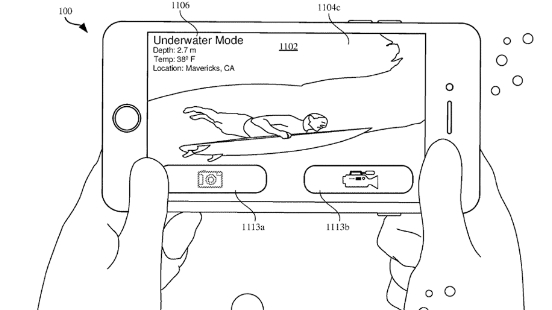Most high-end smartphones these days have a decent amount of water resistance – enough that you can confidently use them in the rain. Except, if you’ve ever tried interacting with a smartphone’s screen in a heavy downpour you know what a lost cause that can be, with the moisture leading to false touches. Apple could have a solution to this though.
In a patent spotted by Forbes and catchily titled ‘Modifying functionality of an electronic device during a moisture exposure event,’ the company details ways that an iPhone could use pressure and moisture sensors to detect ‘moisture events’ – which could range from a small amount of water on the screen, to the phone being fully submerged in water.
Once a moisture event has been detected – and the iPhone has figured out just how much moisture it’s dealing with – the handset would then aim to adapt to this to prevent false touches from being registered.

To aid in that, the on-screen button layout might be changed, by making them larger for example, so they’re easier to hit, or moving them further apart. Some controls might even be removed altogether, leading to a simplified interface with just a few big buttons to hit.
Cleverly, the phone would also use its pressure sensors to ensure that touches are only registered if a certain amount of pressure is made – so a hard push with one of your digits would register, but a drop of water wouldn’t. The amount of pressure required and the layout of the interface could also vary depending on the situation - whether it’s raining or whether you’re underwater for example.
If you are brave enough to use your iPhone underwater then it might also be able to display your current depth, to help ensure you remain within the phone’s water resistance limits.
Analysis: don’t count on seeing this soon if ever
This patent sounds like a potentially great idea, but the caveat we always add with patents is that far more of them get filed and granted than actually get used for commercially available devices.
Apple is always thinking up and experimenting with new ideas, but the vast majority of them don’t see the light of day, be it because they’re too niche, too costly, too hard to implement, or probably any number of other reasons.
So we might never see an iPhone that can comfortably be used when wet, and if we do it’s very unlikely that the iPhone 14 will be that phone – think the iPhone 15 or even later.
Still, more than some patents we’d love to see this become a reality. The underwater use cases might be niche, but everyone gets rained on, so a feature like this could help Apple's handsets stand out among the best smartphones.
from TechRadar - All the latest technology news https://ift.tt/FSp1UlB







No comments:
Post a Comment